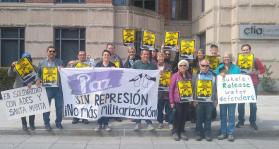After the Amnesty Law: Pursuing Justice in El Salvador
This article was originally published in the December 2016 issue of El Salvador Watch
Following July's Supreme Court ruling to overturn the 1993 Amnesty Law, which prohibited criminal charges for crimes committed during El Salvador's twelve-year Civil War, a court has re-opened a previously shelved case against perpetrators of the El Mozote massacre. On December 11, 1981, US-trained Salvadoran soldiers murdered approximately 900 civilians, including women, children, and infants in El Mozote, Morazán.
The decision to re-open the case comes in response to a request filed in August by family members of the victims. Thus far, eleven high-ranking military officers are accused of crimes ranging from murder, kidnapping, and rape to acts of terrorism. The highest-ranking officials facing prosecution include former Minister of Defense and Public Security, General José Guillermo García, former head of the Armed Forces’ Joint Chiefs of Staff, General Rafael Flores Lima, and former Air Force Commander, General Juan Rafael Bustillo.
The court also requested that the current government provide information in order to locate and notify the accused, as well as to provide official records pertaining to military actions that took place in and around El Mozote at the time the massacre was carried out. The case will resume at the investigatory stage, which is where it was when stayed indefinitely due to the passage of the Amnesty Law. According to their lawyers, the families’ ultimate goal is to know the full truth of what occurred in El Mozote in December 1981; rather than be sentenced to prison, they want the perpetrators to recognize their actions and request forgiveness.
Another case has also been initiated since the Amnesty Law was overturned, one which appears to justify concerns voiced by El Salvador’s social movement that the right-wing would use this opening to attack the Farabundo Martí National Liberation Front (FMLN) government, including President Salvador Sánchez Cerén.
Businessman Armando Durán became the first individual to officially request that the Attorney General open an investigation into a war-era crime when he accused the five members of the FMLN’s wartime General Command, including Sánchez Cerén, of responsibility for his 1986 kidnapping by guerrilla combatants who belonged to one of the FMLN’s member organizations, the People’s Revolutionary Army (ERP).
In interviews with investigative journalists, former guerrilla combatants from the Jiquilisco Bay region where Durán was held for 37 days, report that these types of kidnappings were common and often ordered by local leaders. It is extremely unlikely the upper leadership of the ERP, much less the FMLN's General Command, was even aware of this specific kidnapping. The Attorney General, who has faced criticism from Salvadoran social movement groups over apparent political bias and his close relationship with the US Embassy, has nonetheless initiated an investigation.
In October, the Human Rights Institute at the University of Central America (IDHUCA) presented five more cases for investigation: the murder of Roberto Antonio Miranda López during the 1975 student massacre, the 1980 forced disappearance of María Florentina Escobar, the 1983 capture and torture of Rafael Segura, the 1983 forced disappearance of Dr. Alejandro Mira Zetino, and the 1989 murder of teacher and ANDES-21 union activist María Cristina Gómez. The Attorney General has yet to announce whether he will open investigations into these cases

 "I am a CISPES supporter because continuing to fight for social justice and a more people-centered country means continuing the dream and sacrifice of thousands of my fellow Salvadorans who died for that vision.” - Padre Carlos, New York City
"I am a CISPES supporter because continuing to fight for social justice and a more people-centered country means continuing the dream and sacrifice of thousands of my fellow Salvadorans who died for that vision.” - Padre Carlos, New York City

